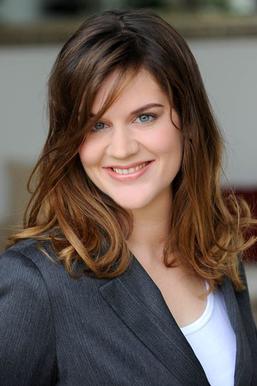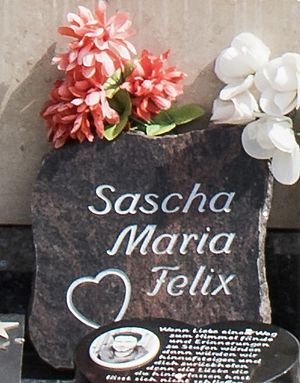Maria Radner facts for kids
Quick facts for kids
Maria Radner
|
|
|---|---|

Radner c. 2011
|
|
| Born |
Maria Friderike Radner
7 May 1981 Düsseldorf, Germany
|
| Died | 24 March 2015 (aged 33) Prads-Haute-Bléone, Alpes-de-Haute-Provence, France
|
| Education | Robert Schumann Hochschule |
| Occupation | Classical contralto |
Maria Friderike Radner (born May 7, 1981 – died March 24, 2015) was a talented German singer. She was known as a contralto, which is a female singer with a very deep voice. Maria performed in operas and concerts all over the world.
She studied music in Düsseldorf, Germany. Many people said she was an "extremely talented" singer, especially when performing music by Richard Wagner. Her deep voice was quite rare. She often sang the role of Erda in Wagner's famous opera series, Der Ring des Nibelungen. She also performed in Mahler's Symphony No. 2, also known as the Resurrection symphony. In 2012, she made her first appearance at the Metropolitan Opera in New York City.
Sadly, Maria Radner, her husband, and their baby son died in March 2015. They were among 150 people killed when Germanwings Flight 9525 crashed.
Contents
Early life and education (1981–2000)
Maria Friderike Radner was born in Düsseldorf, Germany. She had an older brother named Bozidar and a sister named Anna. Her parents had moved from Austria and owned a trading company. They were not very interested in music themselves.
However, Maria loved to sing. During long car trips to Austria, she would sing for hours. At school, she was a quiet but well-liked student. She enjoyed music classes, but found math a bit tricky.
Her singing talent wasn't really noticed at school. But when she was 14, her parents introduced her to a voice teacher named Angelo Melzani. He immediately saw her potential and told her, "I will get you into opera."
As a teenager, Maria also enjoyed local festivals. She took part in the Rhenish Carnival and the Largest Fair on the Rhine. Her father remembered her excitedly calling him after she won first prize in a karaoke contest at a beer tent. Maria finished school at St. Ursula Gymnasium in Düsseldorf in 2000.
Vocal education (2000–2008)
After school, Maria first tried studying German at university. But she didn't like it and left after one semester. She then started training for a job in import and export. She got excellent grades, but she still felt it wasn't the right path for her.
Maria then applied to the Robert Schumann Hochschule for music in Düsseldorf. She was one of only seven students chosen out of 200 applicants. Her voice teacher there, Michaela Krämer, first thought Maria was a mezzo-soprano. This is a female singer with a voice range between a soprano and a contralto.
Maria's father arranged for her to have extra voice lessons. She studied with Jeannette Zarou and later with Marga Schiml. Both of these teachers were experts in early music and Lieder, which are German art songs. They soon realized that Maria was actually a true contralto, with a much deeper voice.
In 2003, Maria's mother passed away after a long illness. About a year later, Maria earned her diploma in music. In 2006, she won third prize in a national singing competition in Germany. She also received a scholarship to attend the 2007 Bayreuth Festival. This festival celebrates the music of Richard Wagner. In 2007, she placed second in another international singing competition.
In 2008, Maria played the role of Cornelia in Handel's opera Giulio Cesare in Egitto. This was her only time working as a full-time member of an opera company. She decided it wasn't for her and chose to become an independent singer. This allowed her to choose her own projects and earn more money.
Even while still a student in 2008, Maria performed with famous conductor Zubin Mehta in Valencia, Spain. She sang in an oratorio, which is a large musical work for voices and orchestra. She also gave her own concert in June 2008.
In August 2008, Maria sang the main role in Handel's opera Solomon at a festival in Austria. Local newspapers praised her, saying she "outshone" other singers. They also noted her "rare pitch of a true alto" and her "impressive charisma." In 2009, she performed in a new production of Parsifal and in Arthur Honegger's Jeanne d'Arc au bûcher in Rome.
Career (2009–2015)
After finishing her studies with top honors, Maria Radner performed in many important concerts and operas. She sang in Beethoven's famous Symphony No. 9 in Turin, Italy. She also gave a special concert in Bayreuth, Germany, featuring songs by Schubert, Brahms, Liszt, and Wagner.
In December 2009, she sang in Mozart's Die Zauberflöte in Munich. The famous conductor Sir Simon Rattle chose her for roles in Wagner's Götterdämmerung at festivals in France and Austria.
In 2009 and 2010, Maria was part of a new production of Stravinsky's Rossignol in Toronto, Canada. She also performed in Beethoven's Missa Solemnis in Amsterdam.
In 2010, Maria first performed the role of Erda in Wagner's Das Rheingold in Leipzig. This became a role she sang every year until her death. She also performed in Mahler's Resurrection symphony again in Rome and Milan. That summer, she was part of new opera productions at the Salzburg Festival in Austria.
In March and April 2011, Maria sang in Die Zauberflöte at La Scala in Milan, Italy. This performance was even recorded on DVD. She continued to sing the role of Erda in other cities. At the Salzburg Festival in July and August, she performed in Richard Strauss's Die Frau ohne Schatten.
In January 2012, Maria Radner made her exciting debut at the Metropolitan Opera in New York City. She sang in Götterdämmerung. This production was so important that it was featured in a film called Wagner's Dream. Her performance on February 11, 2012, was even broadcast on the radio.
In the fall of 2012, she performed in three Wagner operas at the Royal Opera House in London. She sang the role of Erda in Siegfried and Rheingold. She also sang in Dvorak's Requiem and Mahler's Symphony No. 3.
In January 2013, Maria appeared as the valkyrie Schwertleite in Die Walküre in Florence, Italy. She also sang Erda in Das Rheingold in Geneva, Switzerland. In September, she traveled to Bucharest to sing Erda in a concert. She also performed in Dvorak's Stabat Mater in Rome.
From January to May 2014, Maria continued to perform Erda in Geneva. In April 2014, she sang the role of Anna in the opera Les Troyens at La Scala.
Maria Radner gave her final performance as the earth goddess Erda on March 23, 2015. This was in Wagner's Siegfried in Barcelona, Spain. She had also been planning to perform at the Bayreuth Festival in the summer of 2015.
Personal life
Maria Radner was known for being a very kind and generous person. Her friend, singer Karen Cargill, described her as "the most generous-spirited person I have ever met." She was full of laughter and loved the soccer team FC Bayern Munich.
Friends said that Maria's son and partner were her whole life. One magazine wrote that "Radner was a happy mother." They also mentioned that Maria had a private side, unlike many famous opera stars. She was able to simply be "Maria, the wife of insurance specialist Sascha S."
Maria had moved with her partner, Sascha Schenk, to Wuppertal-Kronenberg in Germany. She traveled a lot for her singing career. Sascha looked after his insurance clients in Wuppertal. Maria and Sascha had one son, Felix, who was born on September 12, 2013.
Death
Maria Radner died on March 24, 2015. Her husband Sascha Schenk, their 18-month-old son Felix, and her colleague Oleg Bryjak also died. They were all on Germanwings Flight 9525 when it crashed near Prads-Haute-Bléone, France. The plane was on its way to Düsseldorf after Maria and Oleg had performed in Wagner's Siegfried in Barcelona. The crash was a tragic accident caused by the pilot.
Maria's voice teacher, Michaela Krämer, said Maria was "a magnificent artist and yet remained unassuming, helpful and natural." The Metropolitan Opera in New York released a statement mourning her "untimely and tragic death." They called her "a gifted artist who touched the lives of many."
Discography
- Rundfunk-Sinfonieorchester Berlin Choir / Wagner – Richard Wagner: Das Rheingold. 28 May 2013. PentaTone Classics.
- Gürzenich-Orchester Köln / Markus Stenz, conductor: Gustav Mahler: Symphony No. 8. Oehms Classics; recording of a September 2011 live performance in the Philharmonie Köln. Maria Radner as Maria Egyptiaca (Part 2, Acta Sanctorum).
See also
 In Spanish: Maria Radner para niños
In Spanish: Maria Radner para niños
 | Aurelia Browder |
 | Nannie Helen Burroughs |
 | Michelle Alexander |


